Cork GAA Jersey Wars: UCC v St Finbarr's
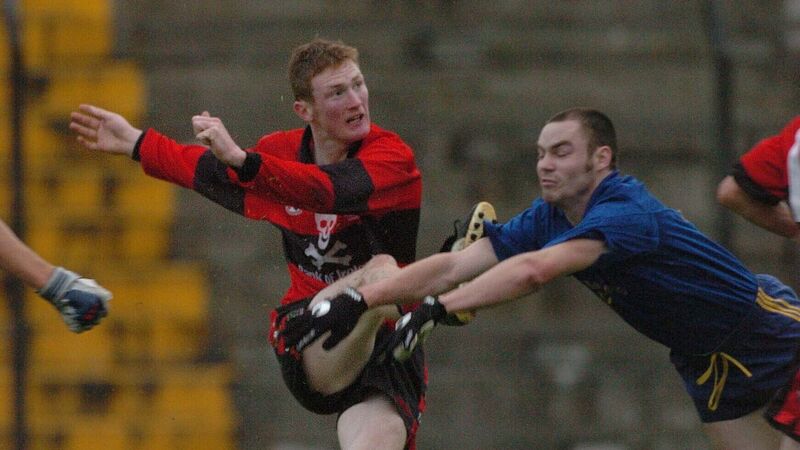
UCC'S Liam Ó Lionáin is tackled by St Finbarr's Paul O'Brien, in 2004. Picture: Eddie O'Hare
WE want to know what your favourite GAA geansaí is.
From here until the end of August, your votes will decide the best design in our Cork GAA Jersey Wars competition.
Our resident jersey expert Denis Hurley compiled a list of 32 clubs, based on those involved in the senior tiers and a selection of wild cards. We put them in alphabetical order and paired them up and we're now down to the last 16 stage.
Full details of the competition are here.
Voting will run from 8am each day for 24 hours on the link below:
According to UCC’s website, “the skull and crossbones have been seen at UCC as far back as 1880-81. In late Victorian times, UCC, then known as Queen’s College Cork, was mostly a medical school and the junior doctors who played for the university’s rugby club, fittingly, used a skull and crossbones as the symbol for their team.
“In later years, other clubs in the university also started to wear the skull and crossbones. The GAA clubs adopted the logo in the mid-1910s and the hockey club has been pictured using it since 1929.
“The skull and crossbones have been officially copyrighted since 1999 and the UCC jersey is a much sought-after garment among students, players, and alumni, both home and abroad.”
Another UCC medical student made his sporting mark with what is thought to be the first instance of a helmet in hurling.
After Micheál Murphy suffered a fractured skull while playing, he sought protective measures and he played in the 1966 county hurling final with a motorbike helmet, before later employing an ice-hocket helmet.
The famed red and black of UCC has enjoyed much success in the inter-varsity Fitzgibbon and Sigerson Cup competitions, while the club has also claimed 10 county senior football championships and two hurling titles.
The most recent football win came in 2011 and the last before that was in 1999, when the club almost won the double, with Blackrock denying them in the hurling decider.

T
That year, perhaps because of the fact that both sides had long runs, the football team wore the second kit of white jersey with a red hoop, but in recent years the College have opted for a reversal of the traditional kit when an alternative is needed – black with a red hoop.
The suspension of the Fitz and Sigerson has meant inactivity on the sporting front since last September’s epic senior hurling semi-final loss to the Rockies, but UCC will be back in action in September with the divisions/colleges section of the county senior championships.
Nowadays, Bank of Ireland’s logo adorns the jerseys just below the skull and crossbones, though once upon a time UCC tended to be sponsored by hostelries frequented by the student body, such as the Washington Inn and the dearly departed Western Star.
The origins of the choice? The story on the club’s website, which is acknowledged as being unverified, comes from a letter written by Johnny O’Herlihy to Con Neenan in the 1970s.
Johnny had played with the Fr O’Leary Hall hurling team but transferred to the Barrs in 1910 and his father Patrick had played for the club in 1870s. Back then, players often competed in their work clothes, with sashes or caps used for identification. Patrick’s wife happened to be walking through Paddy’s Market on North Main St one Saturday and bought a blue jersey for him for the price of one shilling and sixpence. The following day, he wore it to Cuffe’s Field near the Lough where a decision was being made as to the club’s colours and they were so taken with his blue hue that it was adopted.
Seán Beecher’s book ‘The Blues’ notes that there has also been a suggestion that because the Lough parish church is called The Church of the Immaculate Conception, blue was chosen because blue is always associated with Our Lady.
The Barrs’ blue, trimmed with gold, has enjoyed lots of success, with the club the only one in Ireland to have won All-Ireland senior club hurling and football titles. There is one outfit distinction between the two codes, though – white shorts are favoured in hurling while all-blue has prevailed in football since the 1979 county final win over Castlehaven. Previously, football jerseys had a harp whereas hurling ones did not.
For the most recent All-Ireland club title, the 1987 football win, the Barrs were up against Roscommon’s Clann na nGael, who also play in blue and gold and a white set of jerseys was worn. However, after the victory in Croke Park, team captain John Meyler donned a traditional top for the presentation of the cup.

Nowadays, gold jerseys are the second choice – in a modern style compared to the first-choice jersey, which remains unsullied by any superfluous designs. Across the chest is the club name in Irish along with the harp – a sponsor’s name has never appeared on the jerseys in a top-class game, though Ryan’s SuperValu in Togher do enjoy a close relationship with the Barrs and sponsored the off-field gear when the 32-year wait for an SFC title was ended in 2018.
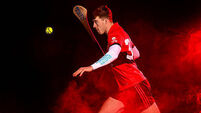
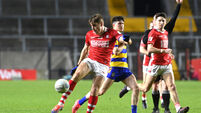

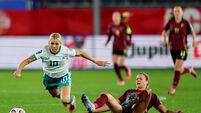
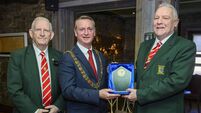
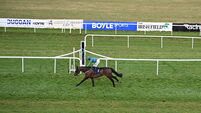



 App?
App?







